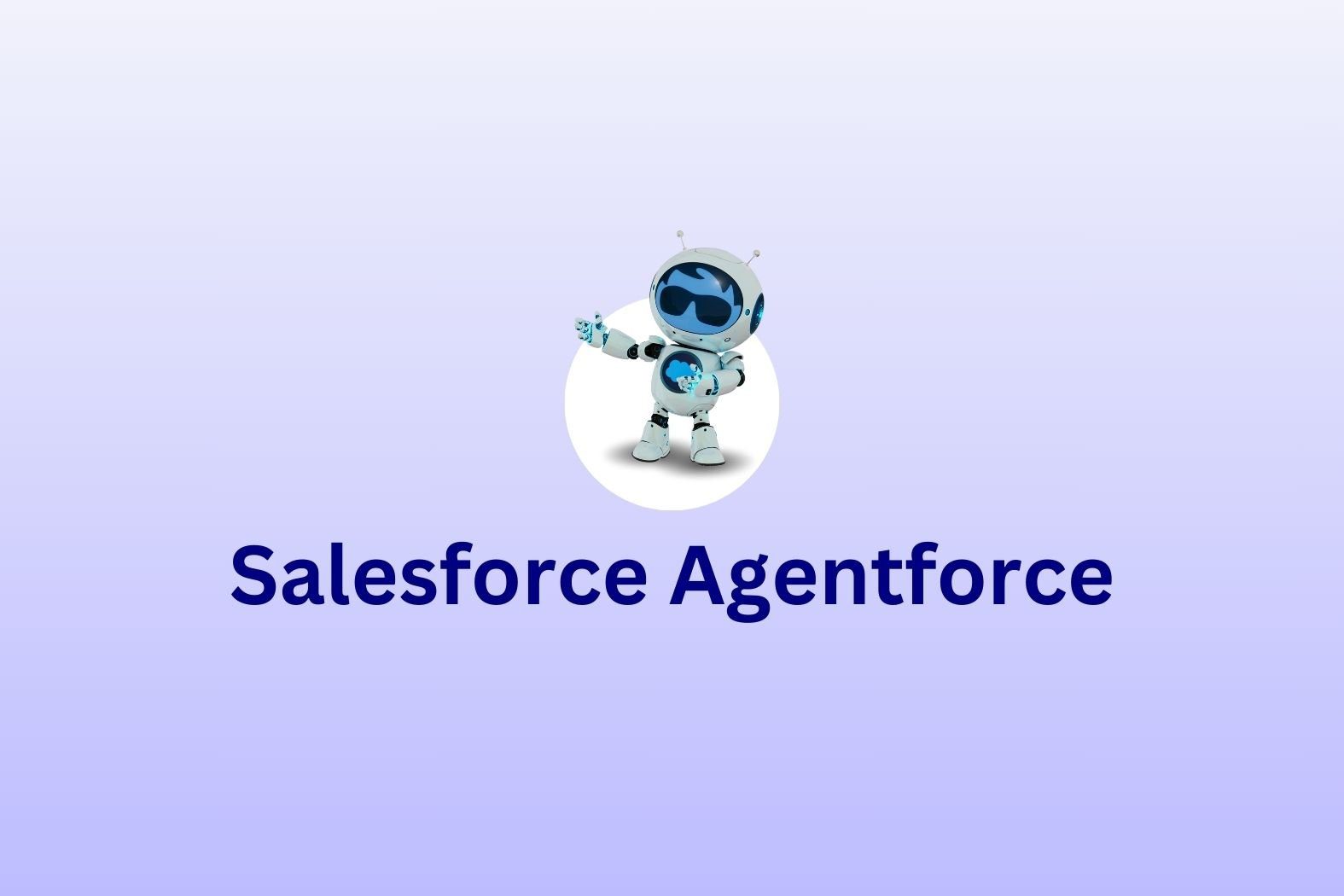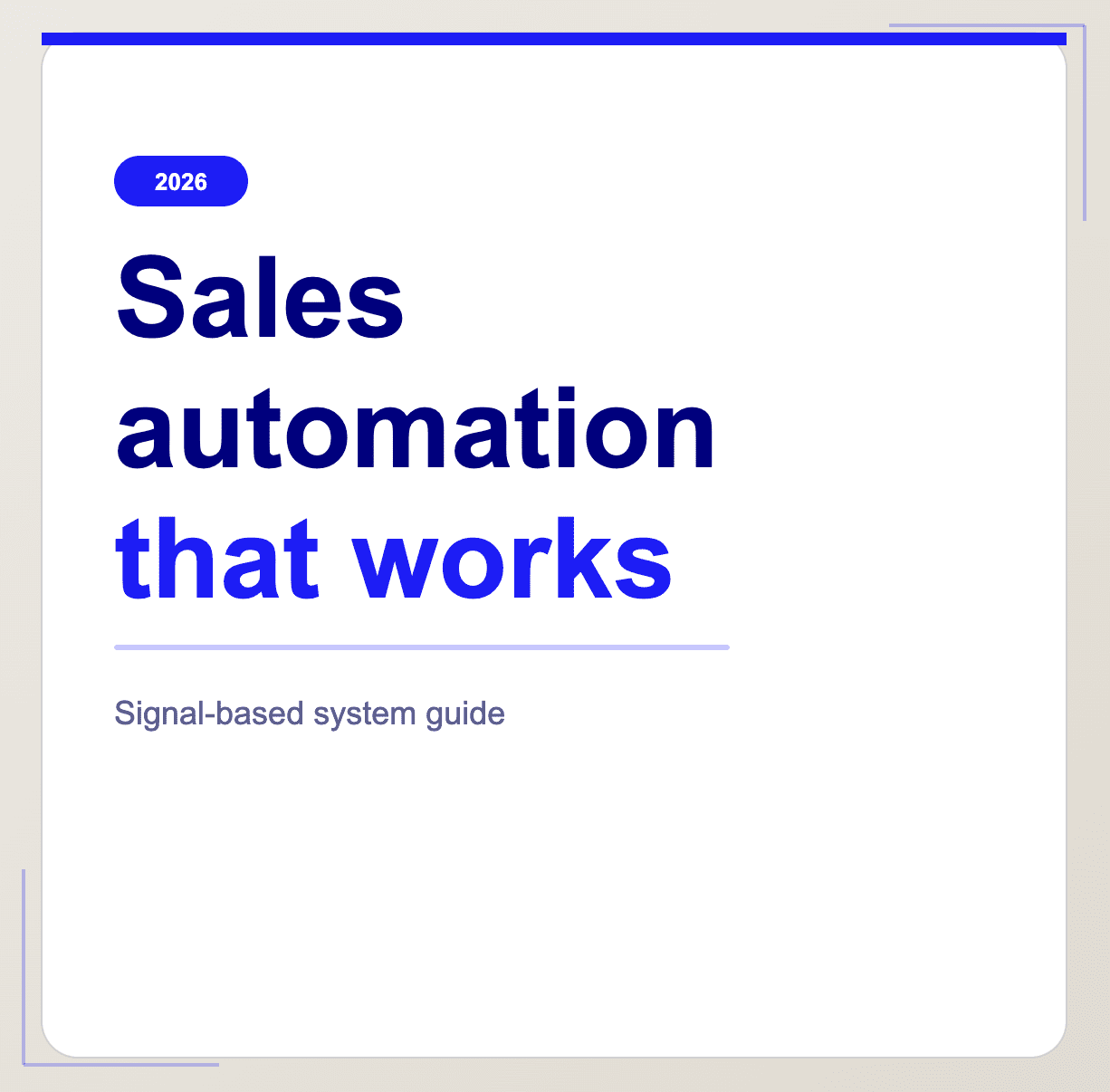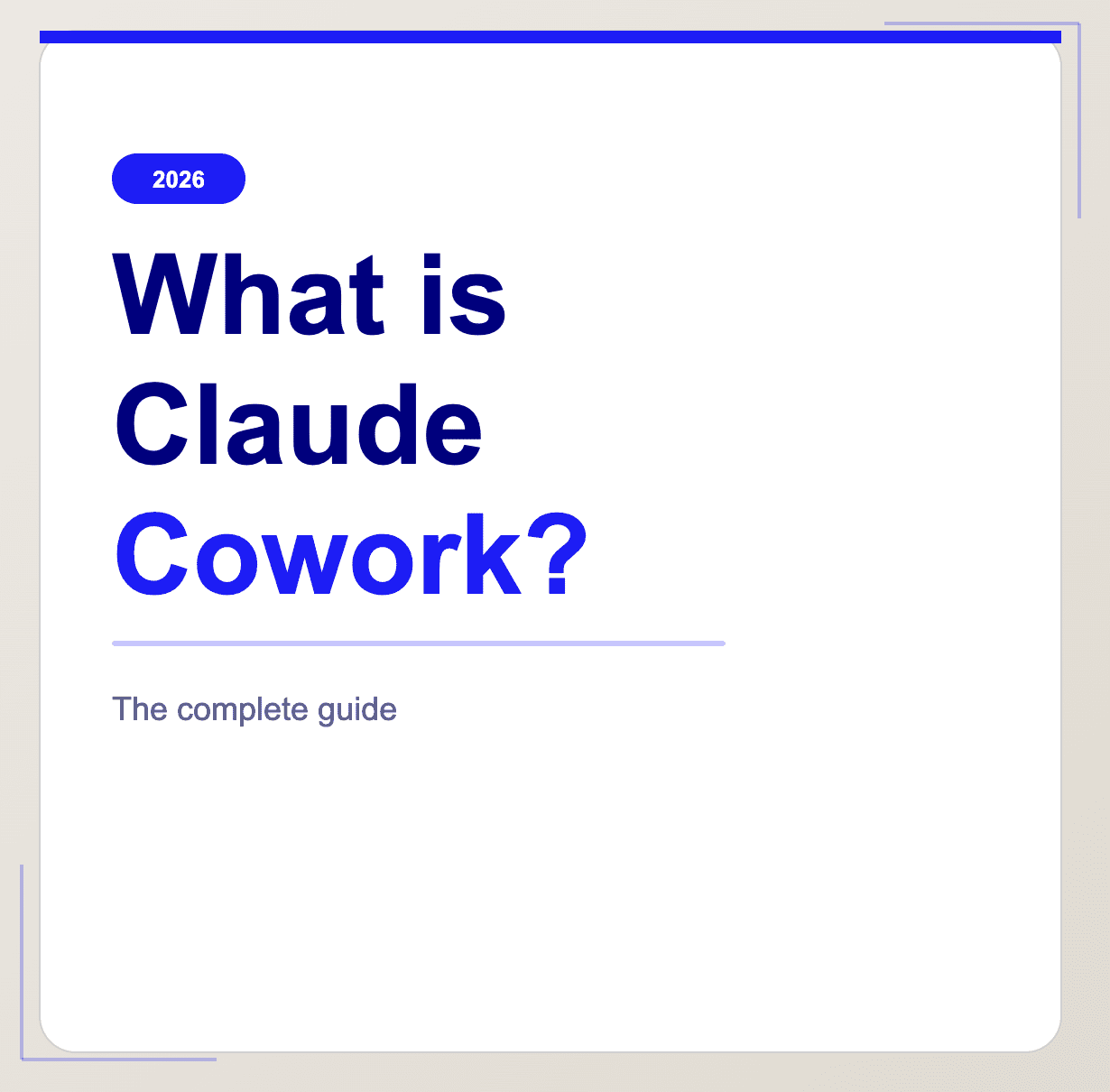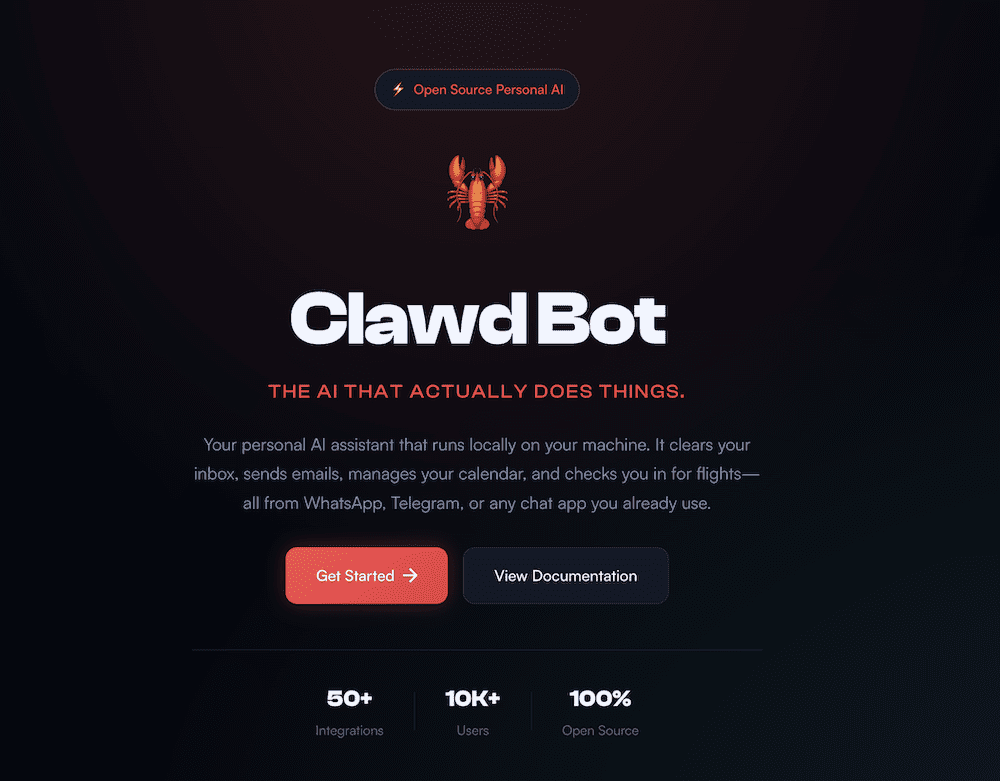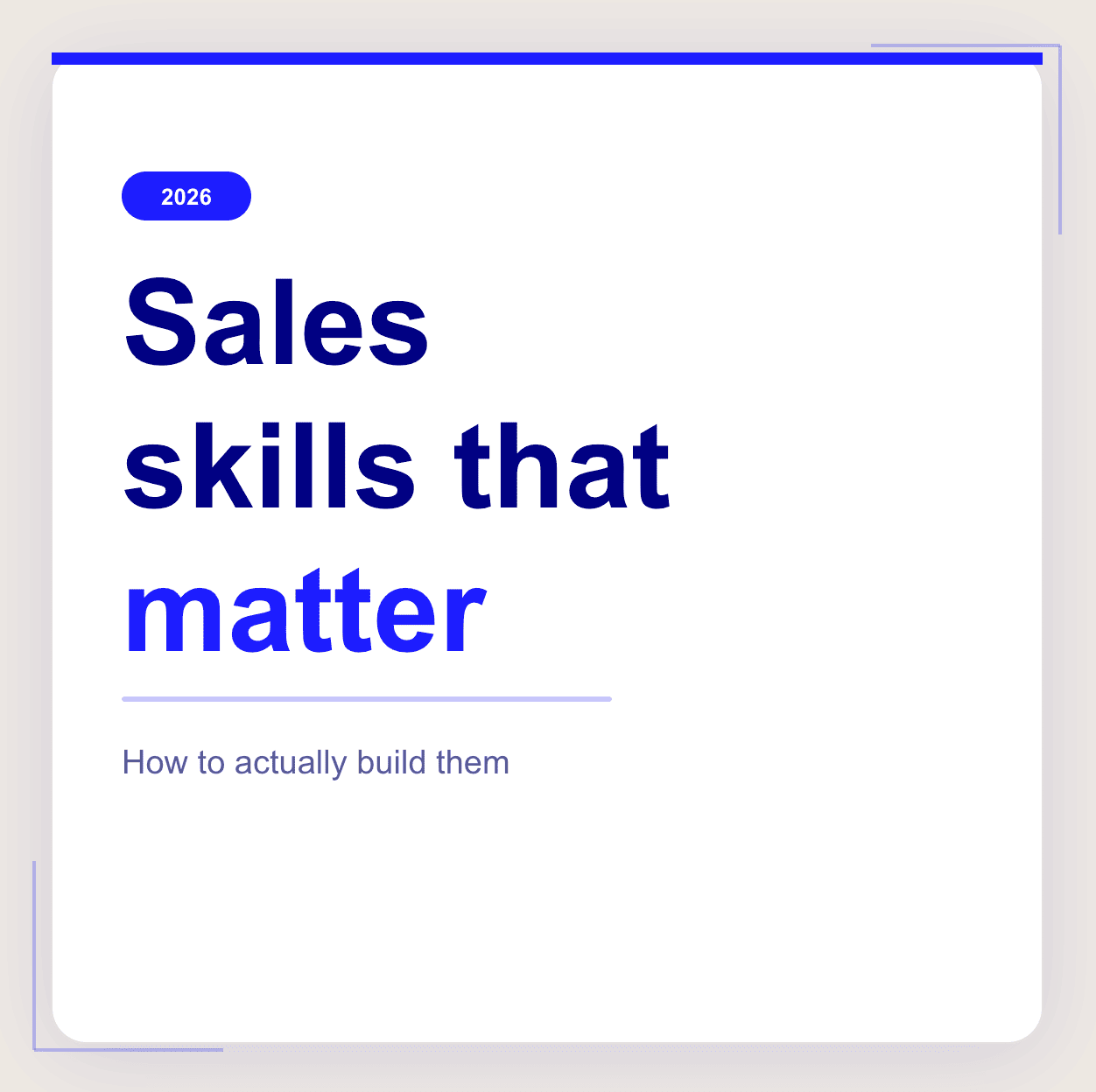If you’ve been hearing the hype but have no idea what’s going on, you might be wondering, “What is Agentforce?” You’re not alone. Agentforce seems to have appeared out of nowhere, but it’s actually part of Salesforce’s bigger push into AI-powered automation. And once you see what it can do for your business, you might just wonder how you ever lived without it.
In short, Agentforce is a Salesforce platform that enables users to build AI-powered agents to automate tasks, streamline workflows, and save time. Whether it’s handling customer inquiries, assisting sales reps, or managing repetitive admin work, Agentforce is designed to do the heavy lifting.
In this guide, we’ll take a closer look at what Agentforce is, how it works, why it’s worth trying, and how it stacks up against the competition.
What is Agentforce?
You’ve probably heard the name floating around – maybe in a tech newsletter, a LinkedIn post, or whispered ominously by your company’s IT guy. But what is Agentforce, really?
In simple terms, Agentforce is Salesforce’s AI-powered automation tool that lets you build AI agents to take care of routine tasks. It’s designed to streamline customer service, sales, and support. Think of it as your business’s way of creating tireless, hyper-efficient digital assistants – only they won’t need coffee breaks or fall victim to existential crises.
What Does Agentforce Actually Do?
Agentforce is built to automate and optimize customer interactions using artificial intelligence. Whether it’s answering customer inquiries, assisting sales reps, or predicting what your clients need before they even know it, this AI-driven tool enables you to create an AI agent for the job. It’s all about making businesses run smoother, faster, and with fewer headaches.
Here’s the gist of what AI agents from Agentforce do:
- Automate repetitive tasks. No more wasting time on copy-pasting emails or manually logging customer details. Agentforce gives you the tools to automate tedious tasks forever.
- Enhance customer support. AI-driven chatbots and virtual assistants handle queries 24/7. They never need to eat, sleep, or go to the toilet.
- Boost sales efficiency. It helps sales reps prioritize leads and personalize outreach. By quickly analyzing data, AI agents can organize and customize at scale.
- Provide actionable insights. AI agents analyze customer data to predict trends and optimize strategies. Even more, they remember context and adapt according to new circumstances.
Who Is Agentforce For?
If you’re in customer service, sales, or any role where talking to people (or avoiding them) is a big part of your day, Agentforce is designed for you. It’s especially useful for:
- Businesses using Salesforce (since it integrates seamlessly).
- Support teams that want AI-powered chatbots to handle common inquiries.
- Sales teams looking to automate lead management and follow-ups.
- Managers and decision-makers who love analytics, dashboards, and cold, hard data. AI agents for project management are particularly useful for these types of people.
Why Is Agentforce Gaining Popularity?
Three words: efficiency, automation, and AI. Okay, that’s technically four words, but you get the point. Businesses are embracing AI-driven solutions to save time, cut costs, and improve customer experience.
Plus, let’s be real, nobody enjoys waiting on hold for customer service or sifting through endless spreadsheets to track leads. Agentforce takes the menial work out of the equation, letting teams focus on what really matters: building relationships, closing deals, and maybe even leaving work on time for once.
As AI continues to revolutionize the way businesses operate, tools like Agentforce are quickly becoming essential rather than optional. Recent data underscores this trend: in 2024, 72% of organizations worldwide integrated AI into at least one business function. That’s a massive rise from 55% the previous year. This surge highlights how rapidly AI adoption is becoming a standard practice for forward-thinking businesses. The companies that jump on board now? They’re the ones staying ahead of the curve.
What Are the Core Features of Agentforce?
Alright, so we know Agentforce is Salesforce’s AI-powered automation tool, but what exactly does it bring to the table? What makes it worth all the buzz? Let’s break down its key features, what they actually do, and why they matter.
1. AI-Powered Virtual Agents
Think of these as your digital customer service reps who never take lunch breaks, call in sick, or need a caffeine fix to function. Agentforce’s AI-driven chatbots and virtual assistants handle customer inquiries, troubleshoot issues, and even assist with sales 24/7, no complaints.
They work within AI agentic frameworks, meaning that when you’re using Agentforce’s AI-powered virtual agents, you’ll unlock faster response times, improved customer satisfaction, and way fewer “Can I speak to a manager?” moments.
2. Automated Workflows & Task Management
Imagine if you could delegate all your soul-draining busywork to a tireless AI. That’s exactly what Agentforce does. It automates routine tasks like logging customer interactions, following up on leads, and assigning support tickets, so your team can focus on the bigger picture.
This saves time, reduces human error, and makes sure no lead or support request falls through the cracks.
3. Smart AI Predictions & Insights
Agentforce doesn’t just automate – it thinks. Well, sort of. Its AI analyzes data, predicts customer needs, and recommends actions to help your team close deals faster, personalize interactions, and stay one step ahead of the game.
This provides better decision-making based on actual data, not just gut feelings and crossed fingers.
4. Seamless Salesforce Integration
Since Agentforce is built within Salesforce, it plays extremely well with the rest of the ecosystem. Whether you’re using Sales Cloud, Service Cloud, or any other Salesforce tool, Agentforce fits right in, syncing data effortlessly and eliminating the usual “Why won’t this system talk to that system?” headaches.
There’s no need for complicated third-party integrations. It just works!
5. Multi-Channel Support
Customers today expect support everywhere: email, chat, social media, WhatsApp, maybe even carrier pigeon (okay, maybe not that last one). Agentforce lets businesses provide consistent, AI-powered support across multiple channels, so no customer gets left behind.
Users can expect a smoother, more unified customer experience, no matter where people reach out.
6. Customizable AI Agents
Not all businesses are the same, and neither are their AI needs. Agentforce allows users to customize their AI agents. From branding and tone of voice to the specific tasks they automate, you can tweak it to act like your ideal employee.
With Agentforce, you’ll get a personalized AI solution that fits your business, not some generic one-size-fits-all setup.
What Makes Agentforce Stand Out?
Agentforce utilizes AI agentic workflows to automate tedious tasks, simplify complex processes, and streamline efficient workflows. It stands out for three primary reasons:
- Built directly into Salesforce. Deeply integrated with one of the most popular CRM systems in the world, Agentforce requires no extra software and no messy integrations. Just plug and play.
- AI that actually learns. The more you use Agentforce’s AI agents, the smarter they get. This is state-of-the-art machine learning.
- Saves time and improves customer experience. A rare win-win in business automation, Agentforce enhances efficiency while cutting costs and saving time. It’s a real no-brainer.
How Does Agentforce Work?
Alright, so we’ve covered what Agentforce is and why it’s worth your attention. But how does it actually work? Is it some magic AI wizardry, or can mere mortals actually use it? Good news; it’s surprisingly straightforward.
Let’s break it down step by step.
1. Setting Up Agentforce
Since Agentforce is built right into Salesforce, getting started is pretty painless (especially compared to some AI tools that require deciphering a 100-page manual).
- Step 1: Log in to Salesforce and navigate to the Agentforce setup.
- Step 2: Customize your AI agents; decide what tasks they should handle, what workflows they’ll automate, and how they’ll interact with customers.
- Step 3: Connect Agentforce to your existing Salesforce tools (Sales Cloud, Service Cloud, etc.).
- Step 4: Let it do its thing while you grab a coffee.
The user interface is intuitive, with drag-and-drop automation tools, easy-to-understand analytics, and a dashboard that doesn’t make you feel like you need an engineering degree. In short, it’s accessible to pretty much anyone: newcomers and experts alike.
2. Automating Tasks Like a Pro
Once set up, Agentforce gets to work, handling everything from customer inquiries and ticketing to lead management and follow-ups.
- Got a customer question? Agentforce’s AI-powered chatbots respond instantly.
- Need to assign a support ticket? It does it automatically based on priority.
- Want to nurture a lead? It follows up with personalized messaging (so you don’t have to).
Instead of constantly checking dashboards, Agentforce keeps things moving in the background. It notifies you when human intervention is actually needed so you can get on with other things without worrying.
3. Learning & Improving Over Time
Here’s where things get interesting. Agentforce doesn’t just automate; it gets smarter. If you’ve made an AI agent for customer success, for example, it will learn from its experiences and improve its responses for the next customer.
- It learns from customer interactions, adjusting responses based on past conversations.
- It refines lead scoring and predictions based on real-time data.
- It provides insights on what’s working and what’s not, so you can optimize your workflows.
Think of Agentforce’s AI agents like Greg from Succession – a little awkward at first, maybe even questionable in their decision-making, but over time, they learn the ropes, adapt to the power structure (your workflows), and become surprisingly competent.
And if you’re worried about losing control, don’t be! Agentforce isn’t about to pull a Logan Roy power move. At the end of the day, you’re still the boss.
4. Integrating with Other Tools
One of Agentforce’s biggest strengths is its seamless integration with the entire Salesforce ecosystem. It also integrates with many other tools beyond just Salesforce.
- It works natively with Salesforce CRM, Sales Cloud, and Service Cloud.
- It can be connected to third-party apps like Slack, email platforms, and social media tools.
- You can sync customer data across platforms to eliminate double entry and missing information.
Agentforce doesn’t have clunky add-ons or a painful setup. Everything just connects which makes using it feel great. Even better, if you wanted an AI agent for meetings, you could integrate Salesforce with tl;dv to automatically fill out your CRM after every customer call.
Real-World Use Cases
Still wondering how companies are actually using Agentforce? Here are a few down to earth examples:
- E-commerce Customer Support. AI agents handle common questions about orders, returns, and tracking, freeing up human agents for more complex cases. They can handle customer support queries with natural language and even personalized speech, making the customer feel valued and understood in the process.
Salesforce themselves report that an impressive 76% of e-commerce teams that utilize AI credit it with revenue growth! - IT & Helpdesk. Agentforce automates ticketing and troubleshooting, reducing the workload on IT teams. When the simple issues are taken off your plate, the more complicated issues get a lot more of your focus.
- Sales Teams. Automated follow-ups ensure no lead goes cold, while AI recommendations help sales reps close deals faster. Some AI agents for sales teams can even offer objection handling tips, negotiating pointers, and sales performance analysis.
Forbes reports that AI agents will cause a 38% increase to profitability by 2035! - Healthcare & Finance. Secure, AI-powered chatbots streamline appointment scheduling and customer inquiries. This keeps everything organized for you and your team.
Hire Your AI Team Without the Payroll Costs
Agentforce isn’t designed to replace humans, it’s built to make them more effective. Whether you’re looking to save time, improve customer experiences, or just keep up with AI-driven competitors, it’s a tool that can dramatically transform the way your business operates.
And the best part? You don’t need to be a tech wizard to use it.
If you’re still not satisfied with Agentforce, however, there are some alternatives that you can take a look at. 👇
How Agentforce Compares to Alternatives
So, you’re sold on the idea of AI agents, but now you’re wondering: is Agentforce really the best option, or is there something shinier out there? A simple look at some AI agent directories will show that there are definitely lots of other options to explore. The more pressing question is: are any of them better than Agentforce?
Let’s see how Agentforce holds up against the big names like Vertex AI, HubSpot Breeze, Zendesk AI, Zoho Zia, IBM Watsonx, Drift, and Intercom.
1. Agentforce vs. Vertex AI (Google’s AI Platform)
Vertex AI is Google’s AI agent builder that allows you to create AI agents based on your specific needs. However, it’s worth noting that Vertex AI is a little bit more complex than Agentforce, requiring some expertise if you want to create more complex agents.
Pros of Vertex AI
- Powered by Gemini. Google’s cutting-edge AI models (including Gemini) power the platform.
- Handles massive datasets. It’s great for predictive analytics as it can digest enormous datasets rapidly.
- Highly customizable. Can be trained on custom data for specialized use cases.
Cons of Vertex AI
- Steep learning curve. Vertex AI is more technical as it requires machine learning expertise to set up and optimize.
- More general-purpose. Not built specifically for CRM or customer service tasks
- No native Salesforce integration. Not natively integrated with Salesforce.
How It Compares to Agentforce
If you want deep AI-powered insights, custom AI model training, and advanced data science capabilities, Vertex AI is a powerhouse. But if your goal is automating sales, customer service, and support within Salesforce, Agentforce is the way to go.
2. Agentforce vs. HubSpot Breeze (HubSpot’s AI Assistant)
HubSpot Breeze is an AI-powered assistant designed for businesses using HubSpot. You can think of it as the HubSpot equivalent to Salesforce’s Agentforce. It streamlines marketing, sales, and customer support within the HubSpot ecosystem.
Pros of HubSpot Breeze
- Seamless HubSpot integration. Works effortlessly within HubSpot CRM.
- Strong email automation. Helps personalize outreach and improve engagement.
- User-friendly. Requires minimal setup and works out of the box.
Cons of HubSpot Breeze
- Limited to HubSpot users. Not useful for businesses outside the HubSpot ecosystem.
- Less powerful automation. Lacks deep workflow automation compared to Agentforce.
- Not as customizable. AI capabilities are more basic compared to advanced competitors.
How It Compares to Agentforce:
Breeze isn’t worth switching CRMs for, but it’s a great choice for those already using Hubspot. However, for Salesforce users who want AI-powered sales and support automation, Agentforce is the better fit.
3. Agentforce vs. Zendesk AI
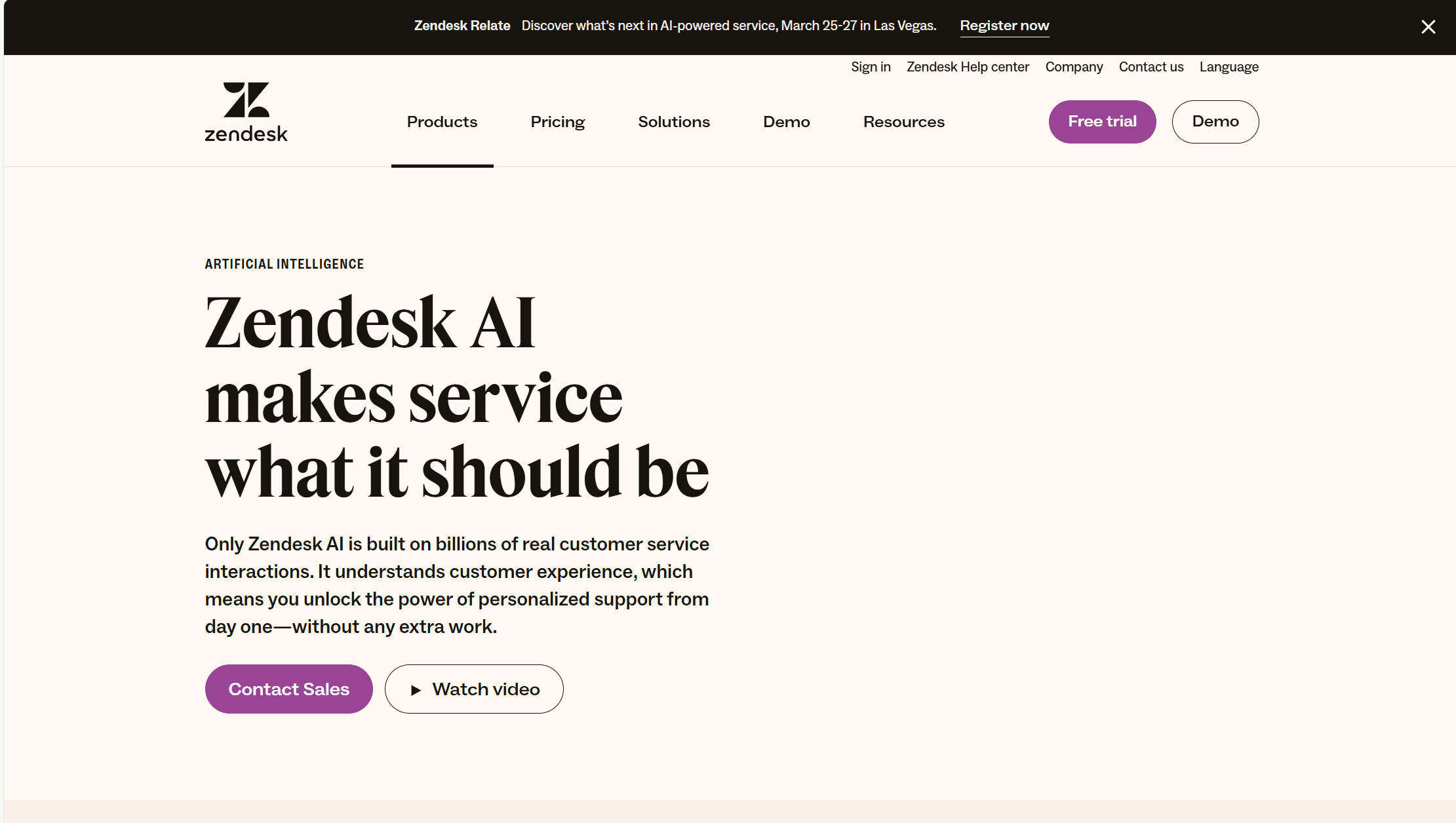
Zendesk AI is an AI-driven tool designed for customer service automation. It helps businesses automate ticketing, improve response times, and handle high support volumes efficiently.
Pros of Zendesk AI
- Excellent for support teams. Optimized for managing customer inquiries and tickets.
- Strong NLP capabilities. AI-powered responses improve efficiency in handling requests.
- Chatbots reduce workload. Automates routine customer interactions.
Cons of Zendesk AI
- Customer support focus. Not ideal for sales automation.
- No deep Salesforce integration. Works best within Zendesk’s own ecosystem.
- Can be expensive. Costs can add up as businesses scale their support teams.
How It Compares to Agentforce
As with Hubspot’s Breeze, Zendesk AI is better suited to its own ecosystem. If your primary need is customer support automation within Zendesk, then Zendesk AI is a great tool. But if you need AI automation for both sales and support inside Salesforce, Agentforce is the clear winner.
4. Agentforce vs. Zoho Zia (Zoho’s AI Assistant)
Zoho Zia is an AI-powered assistant built into Zoho CRM, offering insights, predictions, and automation for businesses using Zoho’s ecosystem.
Pros of Zoho Zia
- Fully integrated with Zoho. Works seamlessly across Zoho’s suite of business tools.
- AI-driven lead scoring. Helps prioritize high-value leads.
- Affordable. More budget-friendly than some competitors.
Cons of Zoho Zia
- Limited outside of Zoho. Not ideal if you use Salesforce or another CRM.
- Less sophisticated AI. Not as advanced in automation as Agentforce.
- Fewer workflow automation options. Better for insights than complex process automation.
How It Compares to Agentforce
If you’re a Zoho CRM user looking for AI-powered insights on a budget, Zia is a good choice. But for businesses using Salesforce that need advanced AI-driven workflow automation, Agentforce is the better tool.
5. Agentforce vs. IBM Watsonx
IBM Watsonx is an AI-powered data analytics and automation platform designed for large enterprises with complex AI needs.
Pros of IBM Watsonx
- Enterprise-grade AI. Designed for massive-scale automation and analytics.
- Highly customizable. Businesses can build AI solutions tailored to their needs.
- Strong data analysis capabilities. Ideal for predictive modeling and business intelligence.
Cons of IBM Watsonx
- Steep learning curve. Requires AI expertise to implement.
- Not built for CRM automation. Lacks native Salesforce integration.
- Expensive. Pricing can be prohibitive for small and mid-sized businesses.
How It Compares to Agentforce
IBM Watsonx is powerful for AI-driven data analysis, but if you’re looking for AI-powered automation for Salesforce sales and support teams, Agentforce is the more practical choice.
6. Agentforce vs. Drift
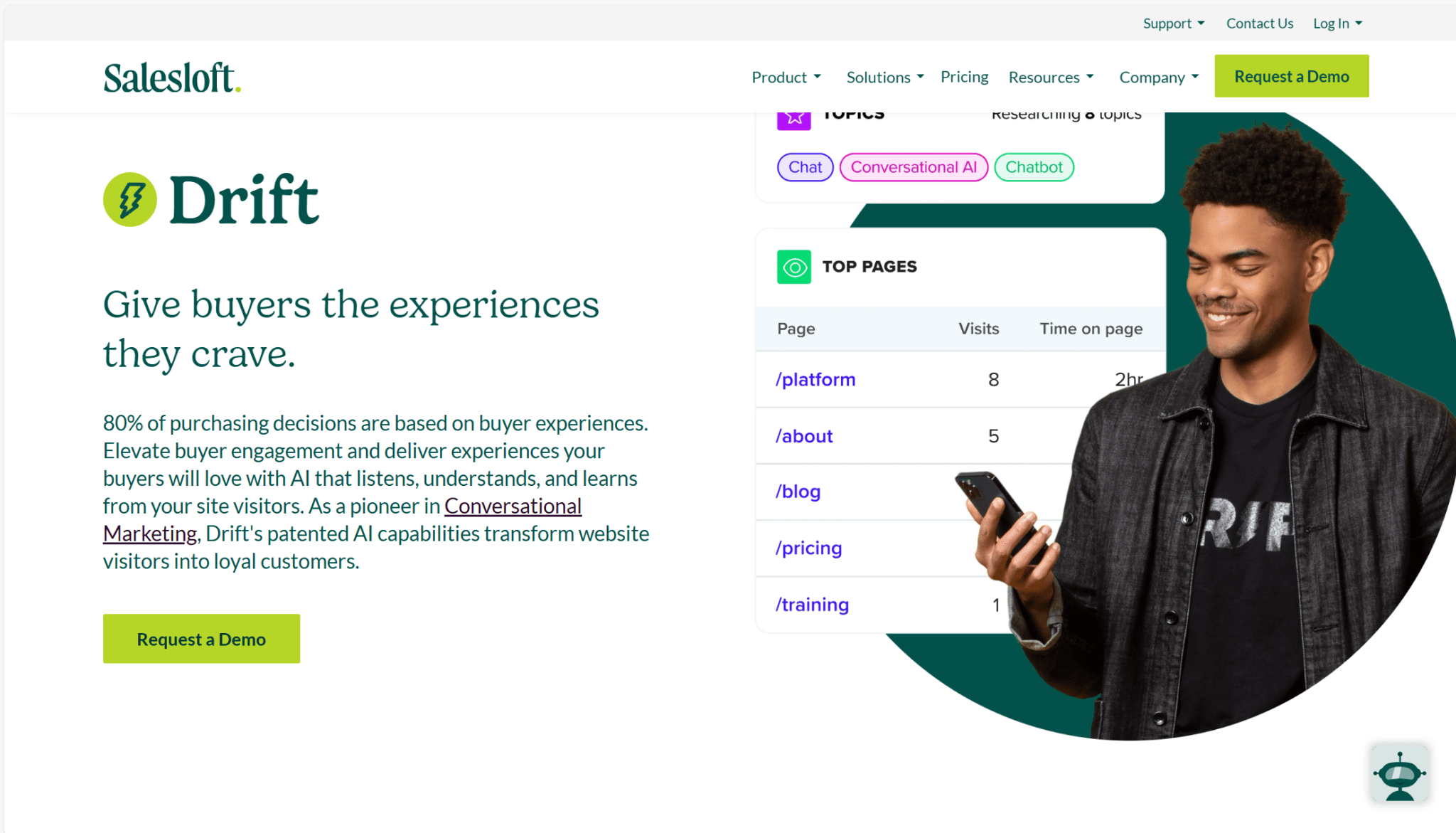
Drift is an AI-powered chatbot and conversational marketing platform designed for real-time customer interactions. It’s now a part of Salesloft, making it a great AI agent builder for sales teams.
Pros of Drift
- AI chatbots for lead generation. Automates conversations to qualify leads.
- Real-time engagement. Helps businesses connect with prospects instantly.
- Strong B2B sales focus. Works well for businesses with long sales cycles.
Cons of Drift
- Limited outside of chat automation. Not a full workflow automation platform.
- Less integration with Salesforce. Doesn’t offer deep CRM automation.
- Expensive for large teams. Pricing increases significantly as usage grows.
How It Compares to Agentforce
If you need AI-powered chatbots for lead generation, or if your team is already using Salesloft, Drift is a solid pick. But if you want end-to-end sales and support automation inside Salesforce, Agentforce is the superior choice.
7. Agentforce vs. Intercom
Intercom is an AI-driven customer messaging platform designed to improve customer engagement through chat and automation.
Pros of Intercom
- Great for customer messaging. AI-powered chat automation helps businesses engage customers.
- Strong automation features. Helps reduce support workload.
- Popular with SaaS companies. Works well for tech and software businesses.
Cons of Intercom
- More focused on messaging. Lacks deep sales automation features.
- No deep Salesforce integration. Works better within its own ecosystem.
- Pricing scales quickly. Can become costly as business needs grow.
How It Compares to Agentforce
If you need AI-powered messaging and engagement tools, Intercom is a great option. But if your priority is AI-powered automation for sales, support, and CRM workflows inside Salesforce, Agentforce is the stronger solution.
Comparison Table: Agentforce vs. Competitors
Agentforce is a powerful tool, but let’s get a bird’s eye view of how it compares to all the competitors listed above.
| Feature | Agentforce 🎯 | Vertex AI 🧠 | HubSpot Breeze 🌬 | Zendesk AI 🤖 | Zoho Zia 🔍 | IBM Watsonx 🏢 | Drift 💬 | Intercom 📩 |
|---|---|---|---|---|---|---|---|---|
| Best For | Salesforce users | Data science & AI | HubSpot users | Customer support | Zoho users | Enterprise AI | AI chatbots | Customer engagement |
| Native CRM Integration | ✅ Yes (Salesforce) | ❌ No | ✅ Yes (HubSpot) | ❌ No | ✅ Yes (Zoho) | ❌ No | ❌ No | ❌ No |
| AI-Powered Automation | ✅ Yes | ✅ Yes | ✅ Yes | ✅ Yes | ✅ Yes | ✅ Yes | 🔄 Limited | ✅ Yes |
| Ease of Use | 🟢 Easy | 🔴 Complex | 🟢 Easy | 🟡 Moderate | 🟢 Easy | 🔴 Complex | 🟢 Easy | 🟢 Easy |
| AI Chatbots | ✅ Yes | ❌ No | ❌ No | ✅ Yes | ✅ Yes | ✅ Yes | ✅ Yes | ✅ Yes |
| Predictive Analytics | ✅ Yes | ✅ Yes | 🟡 Limited | ✅ Yes | ✅ Yes | ✅ Yes | ❌ No | ❌ No |
| Pricing | 💰 Higher-end (1k conversations included in the CRM plan or $2 per conversation) | 💰 Expensive (varies based on AI model and usage) | 💰 Mid-tier ($45 per month for 100 credits) | 💰 Mid-tier ($55-$115+ per month) | 💰 Budget-friendly ($40-$52 per month) | 💰 Very Expensive (contact sales team for a quote) | 💰 High-end ($0-$599 per month) | 💰 High-end ($29-$132 per month) |
FAQs About Agentforce
Agentforce is a powerful new platform, so it stands to reason that there are plenty of people wanting to know more about it. Here, we’ve gathered the most commonly asked questions to answer them all in one place.
1. What is Agentforce used for?
Agentforce is Salesforce’s AI-powered agent automation platform designed to handle tasks like customer support, sales assistance, and workflow automation. It helps businesses streamline operations by deploying AI agents that can manage inquiries, process data, and integrate with CRM tools.
2. Can Agentforce handle customer support inquiries?
Yes! Agentforce can automate responses to common customer questions, assist human agents by gathering relevant data, and even escalate complex issues to the right teams. It improves response times and ensures a consistent customer experience.
3. Does Agentforce integrate with other tools?
Agentforce integrates seamlessly with Salesforce products and third-party tools like Slack, Microsoft Teams, and various helpdesk and CRM platforms. However, the level of integration may vary depending on the tool.
4. How much does Agentforce cost?
Pricing depends on factors like the number of AI agents, the level of automation needed, and additional Salesforce features. Salesforce typically offers custom pricing for enterprise users, so it’s best to check directly with them for a quote.
In short, if you have a Salesforce plan already, you should be able to get up to 1,000 free conversations with Agentforce. If you want additional conversations, or you want to use Agentforce without a Salesforce subscription, you’ll be charged $2 per conversation.
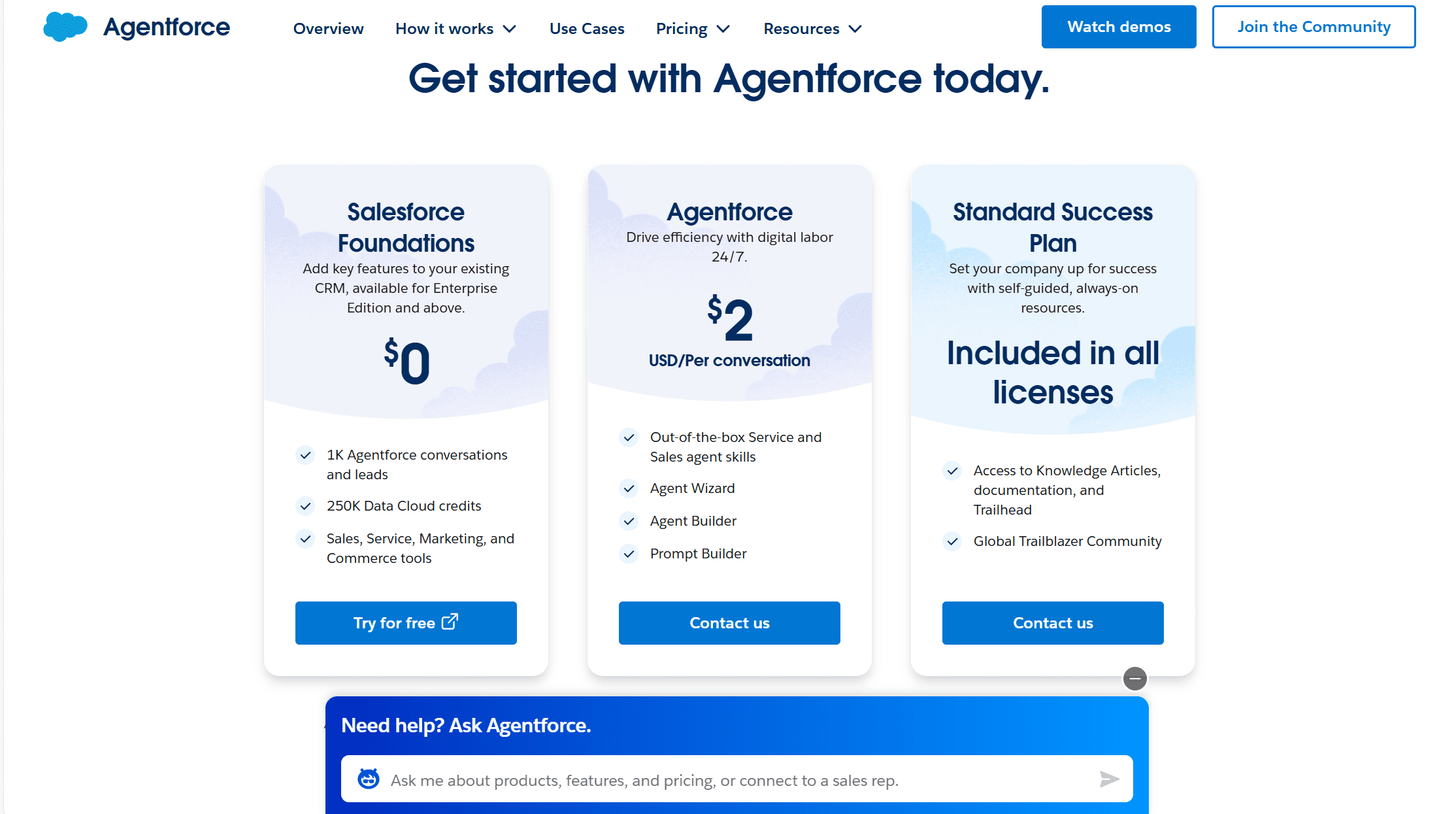
5. Is Agentforce easy to set up?
Yes, if you’re already familiar with Salesforce. It offers a user-friendly interface and pre-built automation templates. However, some customization might require admin-level knowledge of Salesforce workflows.
6. How does Agentforce compare to alternatives like Zendesk AI or HubSpot Breeze?
Agentforce is deeply embedded within Salesforce, making it the best choice for businesses already using the platform. Competitors like Zendesk AI and HubSpot Breeze cater more to companies using their respective ecosystems, so the best option depends on your existing tech stack.
See our comparison guide above for a more detailed answer. ☝️
7. Can Agentforce be customized for specific business needs?
Yes, users can tailor AI agent workflows, automate specific tasks, and integrate them into existing Salesforce processes. However, for deep customization, some knowledge of Salesforce automation tools (like Flow or Apex) may be required.
8. Does Agentforce replace human agents?
Not entirely! Agentforce is designed to enhance human productivity, not eliminate jobs. It handles repetitive tasks, allowing human agents to focus on complex, high-value interactions.
9. Is Agentforce suitable for small businesses?
It depends on how invested you are in Salesforce. Large enterprises benefit the most, but smaller teams using Salesforce might also find value in automating workflows and customer interactions.
10. Which industries benefit the most from Agentforce?
Industries like finance, e-commerce, healthcare, and tech support benefit from Agentforce’s automation capabilities, particularly for customer service and sales teams.
Final Thoughts: Is Agentforce Right for You?
If you’re already using Salesforce and want to automate customer interactions, sales, or workflows, Agentforce is a no-brainer. It seamlessly integrates with your existing setup, handling the repetitive tasks so your team can focus on what matters.
That said, if you need a more general AI automation tool outside of CRM and sales, platforms like Vertex AI or Zendesk AI might be a better fit. But for Salesforce users, Agentforce offers a level of efficiency and ease that’s hard to beat.
Looking for a deeper dive? Check out our Salesforce Agentforce review to see how it stacks up in real-world scenarios.

